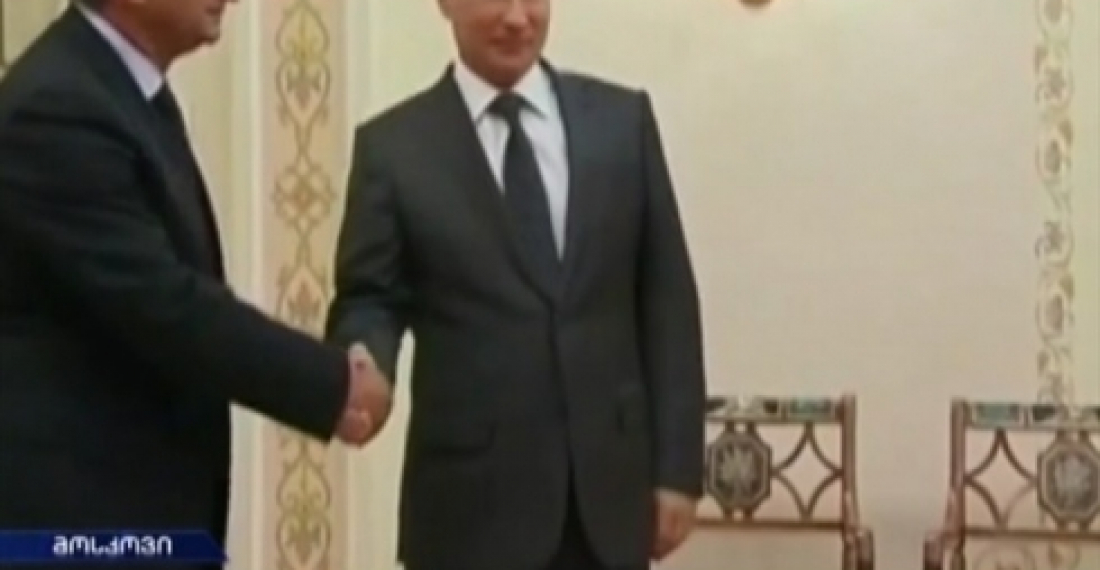Russian President Vladimir Putin will today receive the President of Abkhazia , Raul Khajimba, in Sochi and the two sides are expected to sign a ten year treaty that will formalise Russia's predominant position in Abkhaz affairs. Joseph Alexander Smith reports from Tbilisi for commonspace.eu about the possible implications.
Abkhazia's ambitions to develop its regional transport infrastructure have come under the spotlight recently, as the territory prepares to sign a treaty deepening ties with the Russian Federation.
The issue re-surfaced earlier this month after comments made by Armenia's Deputy Minister for Transport and Communications, Artur Arakelian. Speaking to journalists, Arakelian announced that discussions are ongoing over the restoration of a railway linking Armenia, Georgia, Abkhazia and Russia- a plan previously floated and since largely ignored - and that "a very important decision" is expected "soon."
Coming only days before an opposition-led rally which pointed fingers at the Georgian government for responding inadequately to the Russian proposed treaty with Abkhazia, the comments caught Georgian officials somewhat off-guard. Paata Zakareishvili, Georgia's State Minister for Reconciliation and Civic Equality - the body which manages the floundering Abkhaz-Georgian peace process - quickly came out saying that "nothing is happening" with regard to the Abkhaz railway idea, and that talks are still where they left off two years ago.
Abkhazia's recently-elected President, Raul Khajimba, was somewhat more positive about the idea of a rail-link between Armenia and Russia, but denied that his side had been in talks: "I think it would be interesting for Abkhazia, Russia and Armenia. I can't say whether Georgia is ready to implement this project, but I'm more than confident that its Western backers are unlikely to want to" Khajimba told the news website Caucasian Knot.
A direct rail-link to Russia would be of huge strategic importance to land-locked Armenia, which has recently acceded to the Russian-sponsored Customs Union. The Union aims to facilitate trade between Russia and other former-Soviet republics currently on good terms with the Kremlin. Apart from Armenia and Russia, other members include Kazakhstan and Belarus.
In the Soviet period, railways linked the Armenia and Georgia to Russia via Abkhazia. The railway between Abkhazia and Russia is still functioning, but the westward-link to Georgia hasn't worked since 1992, when the Enguri railway bridge was blown up during Abkhazia's bitter fight for secession.
Restoration of the rail-link has been proposed in the past as part of a regional peace initiative, but while Moscow's allies Armenia and Abkhazia have expressed enthusiasm for the project, Georgia - which fought a brief war with Russia in 2008 - has reacted more cautiously to the plans.
The Abkhaz government, which is recognized only by Russia and a handful of other states, has stated that the chief benefit of a restored rail-link would be increased "political legitimacy" for the Abkhaz state. Georgia - which has pursued closer integration with NATO and the EU despite Russian warnings - remains staunchly opposed to any project that would involve recognizing Abkhazia's de facto government.
Further questions about Abhkazia's regional transport links arose when it was announced on November 14 that Abkhazia's Prime Minister, Beslan Butba, has signed a memorandum of understanding with Russian firm "Airport Development", with a view to reconstructing Sukhumi's battered airport. According to Apsnypress news agency, a draft contract between the company and the Abkhaz government is expected within three months.
Abkhazia has signed such agreements in the past, however, which have not resulted in the airport re-opening. A similar memorandum was signed in 2011 with Novaport, a company which runs several airports in the Russian Federation. Georgia remains opposed to the operation of any flights from Sukhumi airport, and has previously pushed for the International Civil Aviation Organization (ICAO) to blacklist flights in or out of Abkhazia that operate without Tbilisi's consent.
Speculation about the development of Abkhazia's transport infrastructure come as Sukhumi and Moscow prepare to sign a controversial treaty on "alliance and strategic partnership". Moscow's first draft of the treaty included the word "integration" in the title, which sparked outrage in Tbilisi.
Senior Georgian officials have expressed concerns recently that Abkhazia and South Ossetia - another breakaway territory - could become the latest territories to be annexed by Russia, which took control of the Crimean peninsula earlier in the year. Shortly after annexing Crimea, Russia approved plans for a bridge linking Eastern Crimea to Russia.
The latest version of the Russian-Abkhaz treaty, which has been endorsed by both sides, envisages the creation of joint command structures in defence and law enforcement, as well as offering Russian passport-holders in Abkhazia the same pensions and healthcare benefits as are currently available in the Russian Federation.
While the Georgian Foreign Ministry has strongly condemned the treaty as an obvious step towards the "annexation" of Georgian territory, its counterpart in Abkhazia has responded coolly to the controversy: "We have 135 agreements with Russia" said Abkhaz Foreign Minister Vyacheslav Chirikba. "This will be the 136th, so what's the problem?"
Joseph Alexander Smith filed this report from Tbilisi for commonspace.eu
photo: Russian president Putin welcoming the Abkhaz leader, Raul Khadjimba in Sochi (archive picture).







